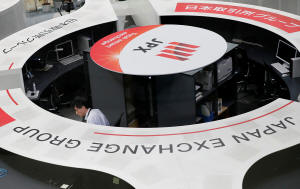Global stocks and bonds turn cautious before US jobs data
 Send a link to a friend
Send a link to a friend
 [December 08, 2023] By
Naomi Rovnick and Tom Westbrook [December 08, 2023] By
Naomi Rovnick and Tom Westbrook
LONDON, SINGAPORE (Reuters) -World stocks teetered on their first weekly
loss since October as a rally fuelled by hopes of the U.S. Federal
Reserve and the European Central Bank cutting interest rates paused
ahead of key U.S. jobs data.
MSCI's broad gauge of world stocks traded flat, heading for a 0.1%
weekly loss after five weeks of gains.
Caution also crept into government debt markets on Friday, with the
10-year Treasury yield rising 5 basis points (bps) to 4.1797%. Germany's
equivalent Bund yield added 5 bps to 2.24%.
U.S. non-farm payrolls figures due later on Friday are expected to show
employers added 180,000 jobs last month. An upside surprise could drive
traders to scale back predictions for more than 125 basis points of Fed
rate cuts next year, analysts warned.
"If the Fed is going to cut aggressively, it will be due to a recession
and a notable drop in inflation led by unemployment. The numbers game of
NFP (non-farm payrolls) suggests we are still far from those levels,"
said BNY Mellon's head of markets strategy and insights, Bob Savage.

Futures indicated the U.S. S&P 500 would flatline in early New York
trading.
Europe's Stoxx 600 share index was 0.6% higher on Friday however, set
for its fourth straight week of increases, as risk appetite remained
high following a sharp slowdown in inflation in the bloc.
COMPLACENCY
Global markets are anticipating rate cuts by central banks as soon as
March next year even though economic forecasters do not expect
significant recessions in the United States or the euro zone.
The S&P 500 has risen more than 9% since early November. The 10-year
Treasury yield which moves inversely to the price of the benchmark debt
and tracks expectations for long-term borrowing costs, has dropped from
more than 5% in late October.
"There's so much complacency in the market right now," said Olivier
Marciot, cross-asset portfolio manager at fund manager Unigestion. "You
can't have a consensus calling for a soft landing and, at the same time,
investors pricing in major cuts."
The VIX, a measure of implied volatility on the S&P 500 that reflects
investor anxiety about stock market corrections, is trading at 13.1,
almost its lowest since before the COVID-19 shock of early 2020.
[to top of second column] |

A man works at the Tokyo Stock Exchange after market opens in Tokyo,
Japan October 2, 2020. REUTERS/Kim Kyung-Hoon/File Photo

YEN SURGE
Japan's yen, meanwhile, was on track for a fourth weekly gain on
Friday as traders speculated the ultra-dovish Bank of Japan was
moving closer to tightening monetary policy.
The yen, last at 144.28 per dollar following a rebound from a near
30-year low last month, was on track for a 1.72% rise this week
after also gaining a similar amount the week before.
"The direction is not a surprise," said State Street's Tokyo branch
manager Bart Wakabayashi. "But this move and the speed of this move
have blown away my expectations."
The Japanese currency gained more than 2% on Thursday after BOJ
Governor Kazuo Ueda forecast an "even more challenging" year ahead,
which traders took as a sign the BOJ could end its negative interest
rate policy as early as January.
The BOJ will next set monetary policy on Dec. 19.
Tokyo's Nikkei ended Friday down 1.7% for a weekly drop of 3.4%,
with exporters such as automakers hardest hit.
The dollar index was set to end the week 0.5% higher at 103.7,
thanks largely to euro weakness. The common currency has fallen 0.9%
this week and was last at $1.079.
Brent crude, which touched a six-month low on Thursday on worries of
sluggish demand, recovered slightly to $75.63 a barrel, but still on
track for a 4.% fall this week.
Gold, having touched a record high early in the week before
recoiling, was flat on the day at $2,030 an ounce.
(Reporting by Tom Westbrook and Naomi Rovnick; Editing by Edmund
Klamann, Emelia Sithole-Matarise and Christina Fincher)
[© 2023 Thomson Reuters. All rights
reserved.]
This material may not be published,
broadcast, rewritten or redistributed.
Thompson Reuters is solely responsible for this content.
 |